Eating the right nuts can do wonders for your dental health. Some nuts strengthen teeth, reduce bacteria, and promote gum health. Others scrub plaque off teeth or contain minerals that keep your enamel strong.
In this comprehensive guide, we will discuss the top nuts for healthy teeth and gums. We will cover:
- Why nuts are good for dental health
- The 7 best nuts for teeth
- Nutrition profiles and dental benefits
- Pro tips for eating nuts for oral health
- Healthy Nuts and Seeds Snack Mix Recipe
- Natural Nut Allergy Remedies
- FAQs on nuts and dental care
Plus, we will share a bonus nut mixture recipe to try at home!
Why Nuts Are Good For Teeth
Nuts offer many nutritional benefits, including advantages for your teeth and gums. Here’s why they deserve a spot in your diet:
1. Strengthen Tooth Enamel
Most nuts contain calcium, phosphorus, vitamin D, and other minerals that help build and maintain strong tooth enamel.
Crunchy nuts also promote saliva flow. Saliva contains minerals and remineralizes your teeth to strengthen weakened areas of enamel.
2. Clean Plaque From Teeth
The coarse texture and crunchiness of nuts help scrub away plaque as you chew. This reduces tartar buildup and bacteria.
Nuts also stimulate saliva to wash away food debris stuck to teeth.
3. Contain Antioxidants
Antioxidants in nuts like vitamin E, selenium, and manganese help protect your mouth from free radical damage and inflammation.
This helps prevent gum disease, cavities, and other oral health issues.
4. Freshen Breath
Compounds like polyphenols in nuts reduce odor-causing bacteria in your mouth. This helps freshen breath.
5. Reduce Inflammation
Nuts have anti-inflammatory properties that decrease inflammation of gums, a major cause of gingivitis and periodontitis.
Now let’s discuss the top nuts for dental health.
The 7 Best Nuts For Healthy Teeth
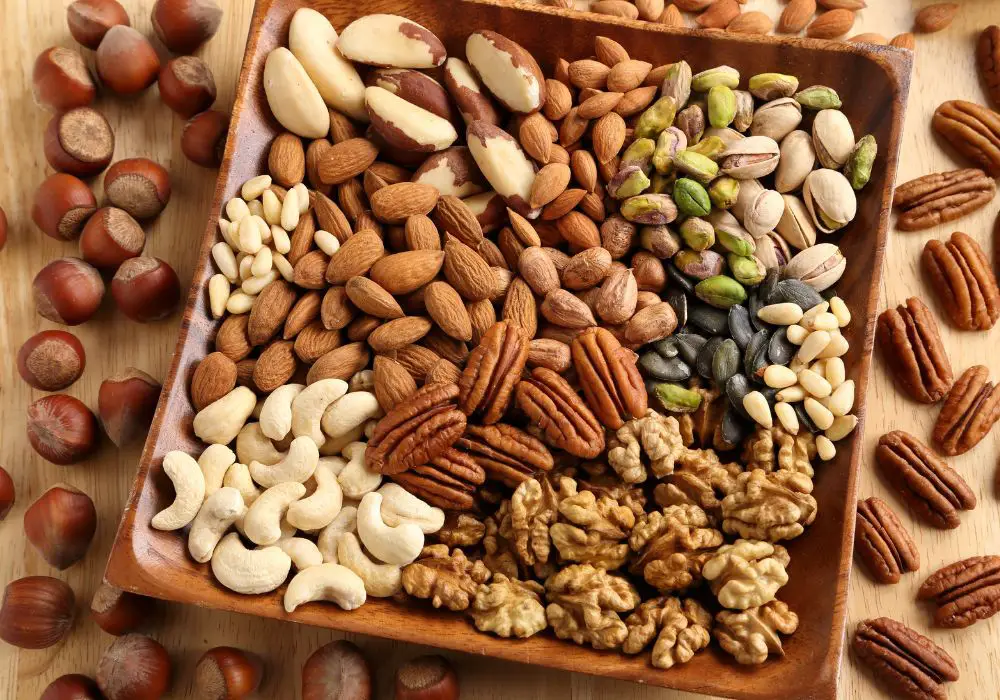
1. Almonds
Almonds top our list due to their stellar nutritional profile.
They are a rich source of:
- Calcium – Helps strengthen tooth enamel.
- Protein – Important for building strong jaw muscles.
- Vitamin D – Works with calcium to protect tooth enamel.
- Phosphorus – Together with calcium, helps remineralize and rebuild teeth.
- Antioxidants like vitamin E – Protects your gums from free radical damage.
Chewing almonds also boosts saliva flow to cleanse teeth.
Further, a 2014 study found that chewing almonds significantly reduced plaque acidity and streptococcus bacteria levels in the mouth.
2. Cashews
Buttery, sweet cashews contain minerals that help promote dental health:
- Phosphorus – Works with calcium to strengthen enamel.
- Magnesium – Prevents enamel decay.
- Copper – Fights harmful oral bacteria.
The monounsaturated fats in cashews also help scrub plaque off teeth.
3. Walnuts
Walnuts are packed with:
- Vitamin E – Protects gums from inflammation and bacterial infection.
- Folic acid – Reduces gum inflammation.
- Antioxidants like ellagic acid – Decreases cavity-causing bacteria in the mouth.
Their rough, irregular texture also helps clean plaque and tartar off teeth.
4. Pistachios
Pistachios contain:
- Phytosterols – Naturally occurring compounds that have antibacterial effects against oral microbes that cause cavities and bad breath.
- Xanthophyll carotenoids – Antioxidants that reduce inflammation of the gums.
- High fiber content – Helps clean debris between teeth.
- Phosphorus – Helps remineralize tooth enamel.
- Calcium – Strengthens jaw bone and teeth.
5. Pecans
Pecans are packed with minerals like:
- Zinc – Prevents plaque buildup and gum disease.
- Manganese – Keeps your enamel strong.
- Vitamin E – Protects against gum infections and problems.
Their antioxidant content also reduces bacteria in the mouth.
6. Hazelnuts
Hazelnuts (or filberts) provide:
- Calcium – For stronger enamel.
- Vitamin E – To decrease oral inflammation and bacteria.
- Monounsaturated fats – That help clean plaque off teeth.
- Phosphorus and magnesium – To remineralize tooth enamel.
7. Brazil Nuts
Brazil nuts stand out for their:
- Selenium content – Selenium helps neutralize free radicals and prevent bad breath. Just 1 Brazil nut provides over 100% of your daily selenium intake!
- Zinc – Helps prevent cavities by controlling plaque.
- Healthy fats – That clean teeth while chewing nuts.
- Protein and magnesium – To strengthen teeth.
Their coarse texture also acts as a toothbrush against your enamel!
Now let’s go over the nutritional profiles of these dental superfood nuts.
Nutrition Profiles Of The Best Nuts For Teeth
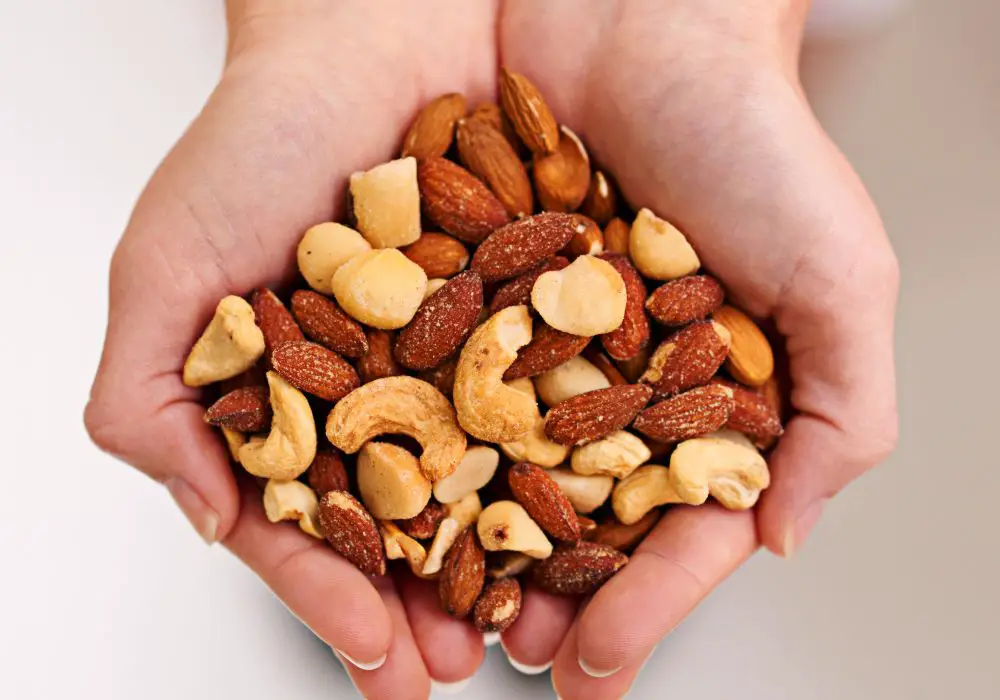
Here is a comparison of the nutrition in 1 ounce (about 28g) of different nuts:
| Nutrient | Almonds | Cashews | Walnuts | Pistachios | Pecans | Hazelnuts | Brazil Nuts |
|---|---|---|---|---|---|---|---|
| Calories | 161 | 155 | 183 | 158 | 193 | 176 | 186 |
| Fat (g) | 14 | 12 | 18 | 13 | 20 | 17 | 19 |
| Protein (g) | 6 | 5 | 4 | 6 | 3 | 4 | 4 |
| Carbs (g) | 6 | 9 | 4 | 8 | 4 | 5 | 3 |
| Calcium (mg) | 75 | 12 | 28 | 32 | 20 | 44 | 160 |
| Phosphorus (mg) | 137 | 168 | 98 | 137 | 70 | 151 | 125 |
| Magnesium (mg) | 76 | 74 | 45 | 34 | 34 | 49 | 107 |
| Vitamin E (mg) | 7.4 | 0.3 | 0.4 | 2.9 | 1.2 | 4.3 | 5.7 |
| Zinc (mg) | 0.8 | 1.1 | 0.9 | 0.6 | 1.2 | 0.7 | 1.1 |
| Selenium (mcg) | 0.5 | 3.1 | 1.9 | 0.5 | 1.5 | 0.7 | 1917 |
As you can see, different nuts shine in different nutrients. That’s why a variety is ideal.
Now let’s go over how to eat nuts for maximum dental benefits.
Pro Tips For Eating Nuts And Oral Health
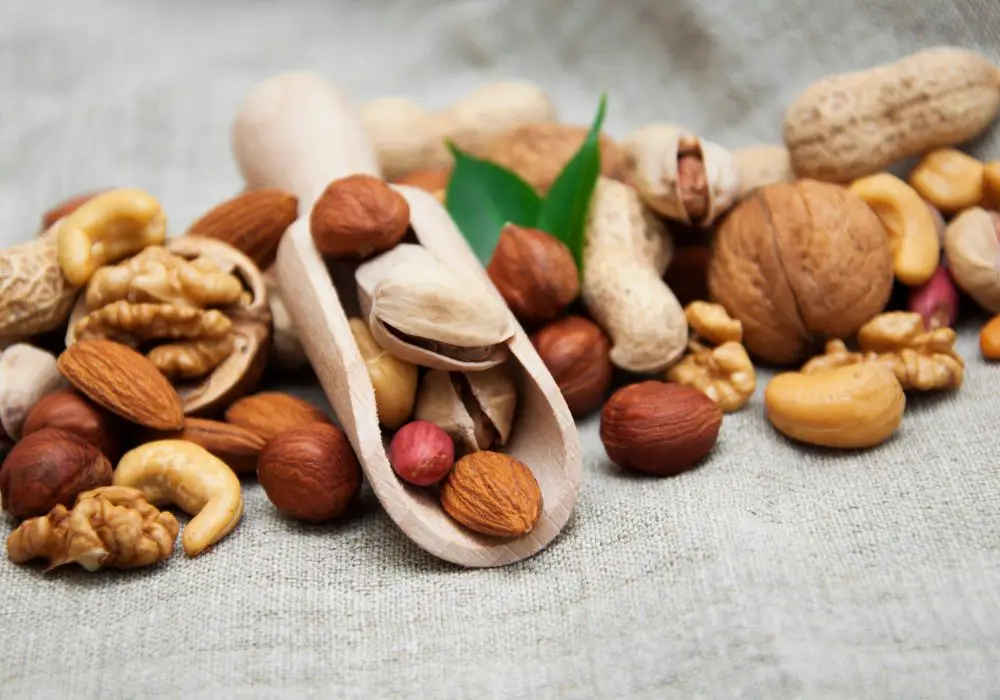
Follow these tips to properly eat nuts for healthy teeth:
Chew Thoroughly
The abrasive texture of nuts helps scrub your teeth clean. But this only works if you chew thoroughly.
Take your time chewing each bite into a paste for the full dental benefits. Chewing also releases more fat from the nut to cleanse the mouth.
Eat Raw and Unsalted
Raw, unsalted nuts have higher nutritional content and are less processed. The skin of raw nuts acts as a toothbrush.
Salt, flavors, and roasted nuts may be tastier, but can reduce dental benefits.
Pair With Fibrous Foods
Eat nuts alongside fibrous fruits and vegetables. This increases saliva flow to wash particles away after chewing nuts. Some good pairings are apples, carrots, celery sticks, and broccoli.
Rinse After Eating
Rinse your mouth with water after eating nuts. This washes away food particles and debris that nuts loosened up.
Limit Portions
Nuts are energy dense, so stick to 1-2 ounces per day. Overindulging adds extra calories and could increase plaque buildup or tooth decay risk if not brushed away.
Brush Teeth After
Even though nuts clean your teeth, it’s still smart to brush within 30 minutes after eating them. This ensures any particles get flushed away before they interact with your enamel. Flossing also helps remove debris.
Store Properly
To maintain freshness and nutritional quality, store nuts in an airtight container in the fridge or freezer.
Now that you know how to eat nuts for oral health, let’s answer some common questions.
Healthy Nuts and Seeds Snack Mix Recipe
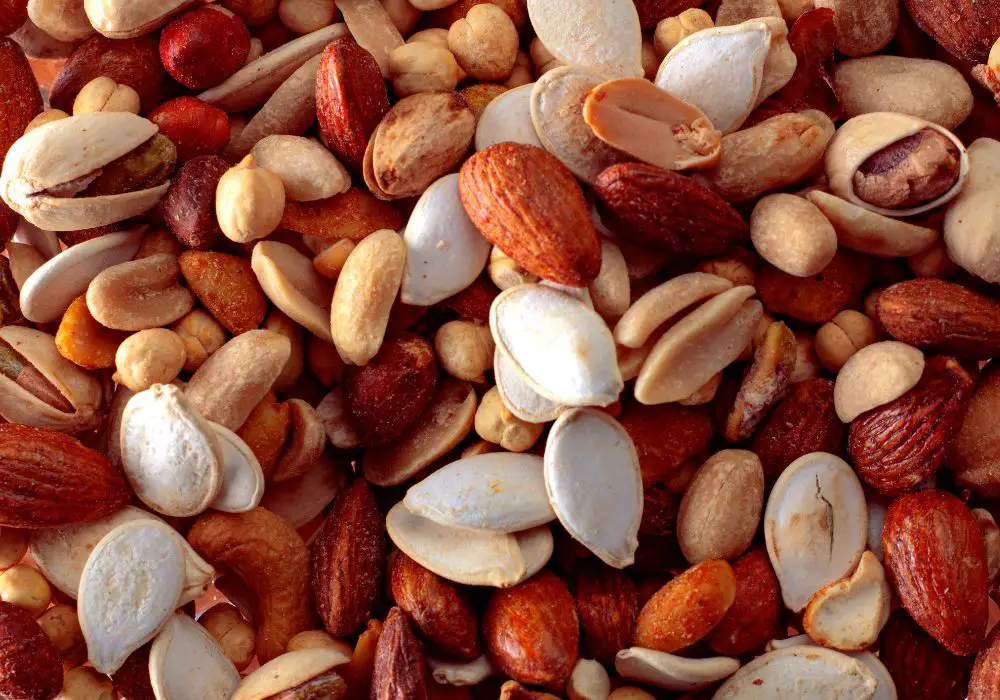
Here is a simple recipe to enjoy a variety of tooth-friendly nuts and seeds:
Ingredients:
- 1⁄4 cup raw almonds
- 1⁄4 cup raw cashews
- 1⁄4 cup raw pecans
- 1⁄4 cup raw walnuts
- 1⁄4 cup raw pumpkin seeds
- 1⁄4 cup raw sunflower seeds
- 1 tsp cinnamon
- 1 tbsp honey
- 1⁄4 tsp salt
Instructions:
- Roughly chop the almonds, cashews, pecans, and walnuts into bite-size pieces. Add to a bowl with the pumpkin seeds and sunflower seeds.
- Add the cinnamon, honey, and salt. Mix well to coat evenly.
- Enjoy a small handful as a snack. Store leftovers in an airtight container.
This homemade trail mix provides a nutritional boost for your teeth thanks to the nuts. The seeds add extra crunch, flavor, and nutrition.
Reading Nutrition Labels for Dental Health
When purchasing nuts, read nutrition labels closely to pick the healthiest options:
- Seek raw or roasted, no added salt – Avoid heavily salted nuts or those cooked in unhealthy oils.
- Check the amount of sugars – Some flavored or honey roasted nuts add excess sugar.
- Look for nuts without preservatives, hydrogenated oils, MSG, or artificial flavors.
- Favor whole nuts over processed nut butters loaded with additives and oils.
- For packaged nuts, choose brands that use eco-friendly packaging – Many use recyclable, compostable, or even reusable containers.
- Buy local nuts in bulk using your own reusable bags when possible to reduce waste.
Smart shopping ensures you maximize the natural nutrition of nuts for your dental and overall health.
Natural Nut Allergy Remedies
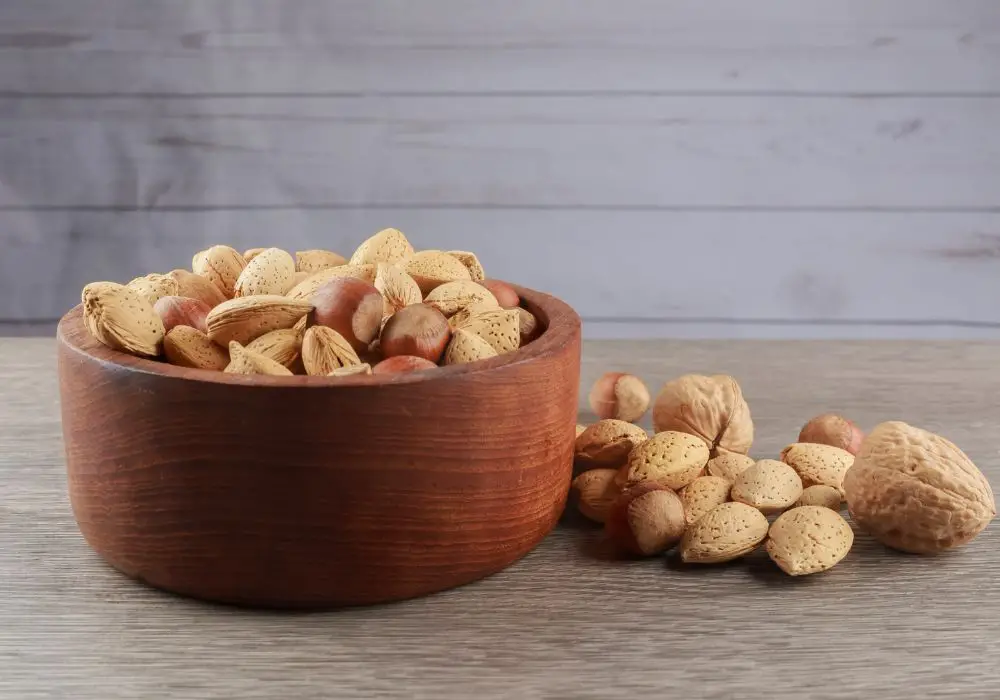
For those with tree nut allergies, natural solutions may help reduce sensitivity:
- Quercetin supplements – This plant flavonoid stabilizes mast cells to prevent allergic responses.
- Vitamin D – Shown to reduce risk of nut allergies in children when taken during pregnancy and infancy.
- Probiotics – Help balance gut bacteria and reduce hypersensitivities.
- Fish oil supplements – Have anti-inflammatory properties that may decrease nut reactions.
- Nettle leaf tea – Contains compounds that reduce histamine release.
- Acupuncture – May help rebalance immune function.
- Salt water rinse – Rinsing the mouth with salt water helps soothe oral irritation from exposure to allergens.
Always discuss natural allergy remedies with your healthcare provider first for safety.
FAQs About Nuts and Dental Health
Q: Which nut is healthiest for teeth?
A: Almonds are the overall best for strong teeth, thanks to their calcium, vitamin D, phosphorus, protein, and antioxidant content. But mixing up your nut choices gives you a variety of tooth-strengthening nutrients.
Q: Are nuts good for your teeth?
A: Yes, most nuts strengthen teeth and promote gum health due to their nutritional content. Their crunchy texture also cleans teeth naturally.
Q: Do nuts help clean your teeth?
A: Yes, chewing nuts thoroughly scrubs plaque, debris, and bacteria off your tooth surfaces and around the gum line where brushing can’t reach.
Q: Can nuts damage or stain your teeth?
A: Nuts won’t directly stain or damage teeth. However, particles can get lodged between teeth after eating. That’s why it’s smart to floss and brush after eating them.
Q: Can you eat nuts with braces?
A: You can eat softer nuts with braces as long as you are careful. Avoid very hard nuts that could damage braces. Nuts like cashews, pecans, and shelled pistachios are safer. Always floss very thoroughly after eating nuts with braces.
Q: Are nuts good for kids’ teeth?
A: Yes, nuts provide nutrients for developing teeth and jaws in kids. Just be mindful of choking hazards for very young children. Chop nuts finely, supervise eating, and pair with soft foods.
Conclusion
Your nut choices directly impact your dental health. The right nuts strengthen enamel, prevent cavities and gum disease, and clean plaque from teeth.
Almonds, walnuts, cashews, and pecans are excellent sources of calcium, phosphorus, zinc, magnesium, and vitamin E for strong teeth.
Chewing nuts thoroughly doubles as a natural toothbrush against your gums and enamel. Just be sure to brush and floss after eating them.
Incorporate a variety of raw, unsalted nuts into your diet for significant oral health benefits. Protect your smile with nature’s toothbrush!






